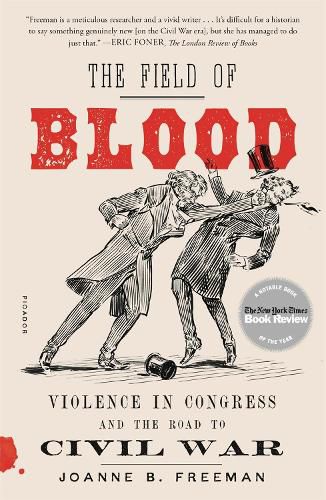Readings Newsletter
Become a Readings Member to make your shopping experience even easier.
Sign in or sign up for free!
You’re not far away from qualifying for FREE standard shipping within Australia
You’ve qualified for FREE standard shipping within Australia
The cart is loading…






In The Field of Blood, Joanne B. Freeman recovers the long-lost story of physical violence on the floor of the U.S. Congress in the decades before the Civil War. Legislative sessions were often punctuated by mortal threats, canings, flipped desks, and all-out slugfests. When debate broke down, congressmen drew pistols and waved Bowie knives. One representative even killed another in a duel. Many were beaten and bullied in an attempt to intimidate them into compliance, particularly on the issue of slavery.
These fights didn’t happen in a vacuum. Freeman’s dramatic accounts of brawls and thrashings tell a larger story of how fisticuffs and journalism, and the powerful emotions they elicited, raised tensions between North and South and led toward war. In the process, she brings the antebellum Congress to life, revealing its rough realities-the feel, sense, and sound of it-as well as its nation-shaping import. The result is riveting-and it reveals fresh understanding of the workings of American democracy and the bonds of Union on the eve of their greatest peril.
.
For readers of Eric Foner and David M. Potter .
A New York Times Book Review Notable Book .
Long-listed for the PEN/John Kenneth Galbraith Award for Nonfiction and a Finalist for the Gilder Lehrman Lincoln Prize
$9.00 standard shipping within Australia
FREE standard shipping within Australia for orders over $100.00
Express & International shipping calculated at checkout
In The Field of Blood, Joanne B. Freeman recovers the long-lost story of physical violence on the floor of the U.S. Congress in the decades before the Civil War. Legislative sessions were often punctuated by mortal threats, canings, flipped desks, and all-out slugfests. When debate broke down, congressmen drew pistols and waved Bowie knives. One representative even killed another in a duel. Many were beaten and bullied in an attempt to intimidate them into compliance, particularly on the issue of slavery.
These fights didn’t happen in a vacuum. Freeman’s dramatic accounts of brawls and thrashings tell a larger story of how fisticuffs and journalism, and the powerful emotions they elicited, raised tensions between North and South and led toward war. In the process, she brings the antebellum Congress to life, revealing its rough realities-the feel, sense, and sound of it-as well as its nation-shaping import. The result is riveting-and it reveals fresh understanding of the workings of American democracy and the bonds of Union on the eve of their greatest peril.
.
For readers of Eric Foner and David M. Potter .
A New York Times Book Review Notable Book .
Long-listed for the PEN/John Kenneth Galbraith Award for Nonfiction and a Finalist for the Gilder Lehrman Lincoln Prize